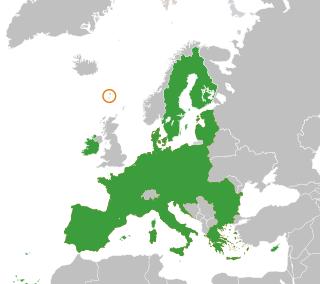The politics of the Faroe Islands a "constituent country" of the Kingdom of Denmark, function within the framework of a parliamentary representative democratic dependency, whereby the Prime Minister of the Faroe Islands is the head of government, and of a multi-party system. The Faroe Islands are politically associated with the Kingdom of Denmark, but have been self-governing since 1948. Executive power is exercised by the government. Legislative power is vested in both the government and the Løgting. The judiciary is independent of the executive and the legislature and the responsibility of Denmark. As of October 25, 2007, the Faroe Islands became one electoral district.

The Faroe Islands are divided into 30 municipalities, six regions/shires and since 2007 there has been only one constituency, earlier there were seven constituencies. Each region has one sheriff (sýslumaður).
Sjálvstýri is a liberal and autonomist political party in the Faroe Islands. It is currently led by the Mayor of Klaksvík Jógvan Skorheim.

The Union Party is a conservative-liberal and agrarian political party in the Faroe Islands. The party wants to maintain the Faroe Islands union with Denmark. On 24 October 2015 Bárður á Steig Nielsen succeeded Kaj Leo Johannesen as party leader.

Republic, formerly known as the Republican Party is a left-wing political party in the Faroe Islands committed to Faroese independence.

The Social Democratic Party is a social-democratic political party in the Faroe Islands, led by Aksel V. Johannesen.
General elections were held in the Faroe Islands on 19 January 2008, the latest possible date. The Self-Government Party and the Centre Party gained a seat each while the Social Democratic Party lost a seat. The number of women went from three to seven.
Same-sex marriage in the Faroe Islands, an autonomous country within the Kingdom of Denmark, has been legal since 1 July 2017. Legislation allowing civil same-sex marriages and adoptions was approved by the Løgting on 29 April 2016. The Danish Parliament approved the necessary legislative adaptations on 25 April, and the law received royal assent on 3 May 2017 and went into effect on 1 July 2017.

The Faroe Islands, a self-governing nation within the Kingdom of Denmark, is not part of the EU, as explicitly asserted by both Rome treaties.
Early general elections were held in the Faroe Islands on 29 October 2011. Faroese law states that new elections must be held at least once every four years; however, either the Prime Minister (Løgmaður) or a majority of the members of the Faroese Parliament may call an election before the end of this period. The previous elections having been held on 20 January 2008, the latest date on which the next elections could have been held was 19 January 2012. However, the Prime Minister of the Faroe Islands, Kaj Leo Johannesen, announced on 27 September 2011 that elections would be held on 29 October 2011. He gave no particular reason for his decision.
Progress is a liberal and pro-Faroese independence political party on the Faroe Islands.
The Second Cabinet of Kaj Leo Johannesen was the government of the Faroe Islands from 14 November 2011 until 15 September 2015 with Kaj Leo Johannesen from Union Party (Sambandsflokkurin) as Prime Minister, making a coalition between Union Party (Sambandsflokkurin), People's Party (Fólkaflokkurin), Self-Government Party (Sjálvstýrisflokkurin) and Centre Party (Miðflokkurin). It is a majority government and the first completely right winged government on the islands since 1985. In September 2013 the Self Governing Party left the coalition and the ministry was closed, after their minister Kári P. Højgaard had been sacked after much discussion about a subsea tunnel between the two largest islands: Streymoy and Eysturoy, Eysturoyartunnilin, which Mr. Højgaard planned to let a private Danish company called Copenhagen Infrastructure Partners make. The plans about making the tunnel were aborted, but in February 2014 all political parties of the Løgting including the independent excluded former member of the Social Democratic Party (Javnaðarflokkurin), Gerhard Lognberg, agreed on making two subseatunnels: Eysturoyartunnilin and Sandoyartunnilin, both are planned to open in 2021 if everything works out as the politicians have planned, and they will be made by the Faroese government.

Aksel Vilhelmsson Johannesen is a Faroese lawyer and politician for the Social Democratic Party (Javnaðarflokkurin) and a former footballer. He is the current prime minister of the Faroe Islands.

Eysturoyartunnilin is a large infrastructure project which will connect the island of Streymoy to the island of Eysturoy through a sub-sea road tunnel under the Tangafjørður fjord in the Faroe Islands. It will also cross the southern part of Skálafjørður and connect the towns of Runavík on the Eastern side and Strendur on the Western side of the fjord. Altogether, the three-branched sub-sea tunnel will be 11.24 kilometres long, including an underwater roundabout. Construction costs are estimated to be around 1 billion DKK.[7] Drilling commenced on 21 February 2017 and the tunnel is to be finished by 2019.. Medio June 2018 the project marked its halfway milestone.

Jógvan Skorheim is a Faroese business man and politician (Self-Government Party. He is the leader of Self-Government Party since 9 April 2015.
Sonja J. Jógvansdóttir is a Faroese journalist, establisher and coordinator of SAMTAK and politician, who until 16 September was a member of Social Democratic Party (Javnaðarflokkurin). She is a spokesperson for the rights of homosexual people and their rights in the Faroe Islands and was one of the establisher of LGBT Faroe Islands in 2011.

Katrin Kallsberg is a Faroese gynaecologist and politician Republic (Tjóðveldi).

Kristin Michelsen is a Faroese politician.


















